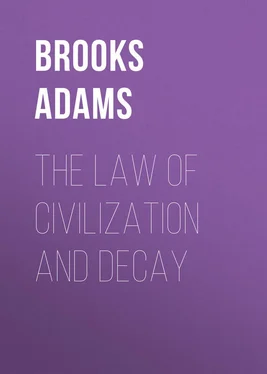Brooks Adams - The Law of Civilization and Decay
Здесь есть возможность читать онлайн «Brooks Adams - The Law of Civilization and Decay» — ознакомительный отрывок электронной книги совершенно бесплатно, а после прочтения отрывка купить полную версию. В некоторых случаях можно слушать аудио, скачать через торрент в формате fb2 и присутствует краткое содержание. Жанр: foreign_antique, foreign_prose, на английском языке. Описание произведения, (предисловие) а так же отзывы посетителей доступны на портале библиотеки ЛибКат.
- Название:The Law of Civilization and Decay
- Автор:
- Жанр:
- Год:неизвестен
- ISBN:нет данных
- Рейтинг книги:4 / 5. Голосов: 1
-
Избранное:Добавить в избранное
- Отзывы:
-
Ваша оценка:
- 80
- 1
- 2
- 3
- 4
- 5
The Law of Civilization and Decay: краткое содержание, описание и аннотация
Предлагаем к чтению аннотацию, описание, краткое содержание или предисловие (зависит от того, что написал сам автор книги «The Law of Civilization and Decay»). Если вы не нашли необходимую информацию о книге — напишите в комментариях, мы постараемся отыскать её.
The Law of Civilization and Decay — читать онлайн ознакомительный отрывок
Ниже представлен текст книги, разбитый по страницам. Система сохранения места последней прочитанной страницы, позволяет с удобством читать онлайн бесплатно книгу «The Law of Civilization and Decay», без необходимости каждый раз заново искать на чём Вы остановились. Поставьте закладку, и сможете в любой момент перейти на страницу, на которой закончили чтение.
Интервал:
Закладка:
Thus by economic necessity great estates were formed in the hands of the economically strong. As the value of cereals fell, arable land passed into vineyards or pasture, and, the provinces being unable to sustain their old population, eviction went on with gigantic strides. Had the Romans possessed the versatility to enable them to turn to industry, factories might have afforded a temporary shelter to this surplus labour, but manufactures were monopolized by the East; therefore the beggared peasantry were either enslaved for debt, or wandered as penniless paupers to the cities, where gradually their numbers so increased as to enable them to extort a gratuitous dole. Indeed, during the third century, their condition fell so low that they were unable even to cook the food freely given them, and Aurelian had their bread baked at public ovens. 29 29 Vopiscus, Aurelianus , 35.
As centralization advanced with the acceleration of human movement, force expressed itself more and more exclusively through money, and the channel in which money chose to flow was in investments in land. The social system fostered the growth of large estates. The Romans always had an inordinate respect for the landed magnate, and a contempt for the tradesman. Industry was reputed a servile occupation, and, under the Republic, the citizen who performed manual labour was almost deprived of political rights. Even commerce was thought so unworthy of the aristocracy that it was forbidden to senators. “The soil was always, in this Roman society, the principal source and, above all, the only measure of wealth.”
A law of Tiberius obliged capitalists to invest two-thirds of their property in land. Trajan not only exacted of aspirants to office that they should be rich, but that they should place at least one-third of their fortune in Italian real estate; and, down to the end of the Empire, the senatorial class “was at the same time the class of great landed proprietors.” 30 30 L’Invasion Germanique , Fustel de Coulanges, 190.
The more property consolidated, the more resistless the momentum of capital became. Under the Empire small properties grew steadily rarer, and the fewer they were, the greater the disadvantage at which their owners stood. The small farmer could hardly sustain himself in competition with the great landlord. The grand domain of the capitalist was not only provided with a full complement of labourers, vine-dressers, and shepherds, but with the necessary artisans. The poor farmer depended on his rich neighbour even for his tools. “He was what a workman would be to-day who, amidst great factories, worked alone.” 31 31 Le Colonat Romain: Recherches sur quelques Problèmes d’Histoire , Fustel de Coulanges, 143.
He bought dearer and sold cheaper, his margin of profit steadily shrunk; at last he was reduced to a bare subsistence in good years, and the first bad harvest left him bankrupt.
The Roman husbandman and soldier was doomed, for nature had turned against him; the task of history is but to ascertain his fate, and trace the fortunes of his country after he had gone.
Of the evicted, many certainly drifted to the cities and lived upon charity, forming the proletariat, a class alike despised and lost to self-respect: some were sold into slavery, others starved; but when all deductions have been made, a surplus is left to be accounted for, and there is reason to suppose that these stayed on their farms as tenants to the purchasers.
In the first century such tenancies were common. The lessee remained a freeman, under no subjection to his landlord, provided he paid his rent; but in case of default the law was rigorous. Everything upon the land was liable as a pledge, and the tenant himself was held in pawn unless he could give security for what he owed. In case, therefore, of prolonged agricultural depression, all that was left of the ancient rural population could hardly fail to pass into the condition of serfs, bound to the land by debts beyond the possibility of payment.
That such a depression actually occurred, and that it extended through several centuries, is certain. Nor is it possible that its only cause was Egyptian competition, for had it been so, an equilibrium would have been reached when the African exchanges had been adjusted, whereas a continuous decline of prices went on until long after the fall of the Western Empire. The only other possible explanation of the phenomenon is that a contraction of the currency began soon after the death of Augustus, and continued without much interruption down to Charlemagne. Between the fall of Carthage and the birth of Christ, the Romans plundered the richest portions of the world west of the Indus; in the second century, North Africa, Macedon, Spain, and parts of Greece and Asia Minor; in the first, Athens, Cappadocia, Syria, Gaul, and Egypt. These countries yielded an enormous mass of treasure, which was brought to Rome as spoil of war, but which was not fixed there by commercial exchanges, and which continually tended to flow back to the natural centres of trade. Therefore, when conquests ceased, the sources of new bullion dried up, and the quantity held in Italy diminished as the balance of trade grew more and more unfavourable.
Under Augustus the precious metals were plenty and cheap, and the prices of commodities were correspondingly high; but a full generation had hardly passed before a dearth began to be felt, which manifested itself in a debasement of the coinage, the surest sign of an appreciation of the currency.
Speaking generally, the manufactures and the more costly products of antiquity came from countries to the east of the Adriatic, while the West was mainly agricultural; and nothing is better established than that luxuries were dear under the Empire, and food cheap. 32 32 Organisation Financière chez les Romains , Marquardt, 65 et seq.
Therefore exchanges were unfavourable to the capital from the outset; the exports did not cover the imports, and each year a deficit had to be made good in specie.
The Romans perfectly understood the situation, and this adverse balance caused them much uneasiness. Tiberius dwelt upon it in a letter to the Senate as early as 22 A.D. In that year the ædiles brought forward proposals for certain sumptuary reforms, and the Senate, probably to rid itself of a delicate question, referred the matter to the executive. Most of the emperor’s reply is interesting, but there is one particularly noteworthy paragraph. “If a reform is in truth intended, where must it begin? and how am I to restore the simplicity of ancient times?.. How shall we reform the taste for dress?.. How are we to deal with the peculiar articles of female vanity, and, in particular, with that rage for jewels and precious trinkets, which drains the Empire of its wealth, and sends, in exchange for bawbles, the money of the Commonwealth to foreign nations, and even to the enemies of Rome?” 33 33 Tacitus, Ann. , Murphy’s trans., iii. 53.
Half a century later matters were, apparently, worse, for Pliny more than once returned to the subject. In the twelfth book of his Natural History, after enumerating the many well-known spices, perfumes, drugs, and gems, which have always made the Eastern trade of such surpassing value, he estimated that at the most moderate computation 100,000,000 sesterces, or about $4,000,000 in coin, were annually exported to Arabia and India alone; and at a time when silk was worth its weight in gold, the estimate certainly does not seem excessive. He added, “So dear do pleasures and women cost us.” 34 34 Nat. Hist. , xii. 18.
The drain to Egypt and the Asiatic provinces could hardly have been much less serious. Adrian almost seems to have been jealous of the former, for in his letter to Servianus, after having criticised the people, he remarked that it was also a rich and productive country “in which no one was idle,” and in which glass, paper and linen were manufactured. 35 35 Vopiscus, Saturninus , 8.
The Syrians were both industrial and commercial. Tyre, for example, worked the raw silk of China, dyed and exported it. The glass of Tyre and Sidon was famous; the local aristocracy were merchants and manufacturers, “and, as later the riches acquired in the East flowed to Genoa and Venice, so then the commercial gains of the West flowed back to Tyre and Apamea.” 36 36 Provinces of the Roman Empire , Mommsen, ii. 140.
Интервал:
Закладка:
Похожие книги на «The Law of Civilization and Decay»
Представляем Вашему вниманию похожие книги на «The Law of Civilization and Decay» списком для выбора. Мы отобрали схожую по названию и смыслу литературу в надежде предоставить читателям больше вариантов отыскать новые, интересные, ещё непрочитанные произведения.
Обсуждение, отзывы о книге «The Law of Civilization and Decay» и просто собственные мнения читателей. Оставьте ваши комментарии, напишите, что Вы думаете о произведении, его смысле или главных героях. Укажите что конкретно понравилось, а что нет, и почему Вы так считаете.












